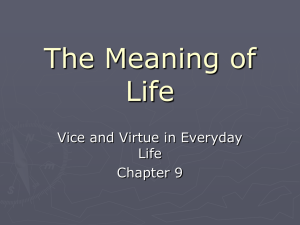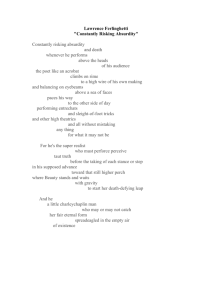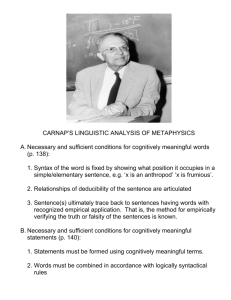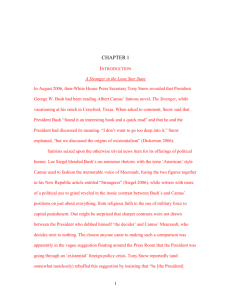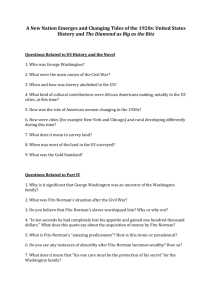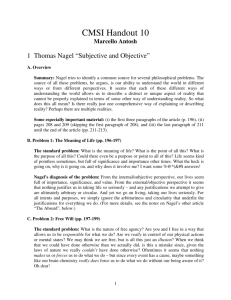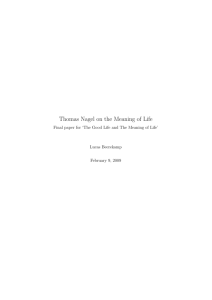The Meaning of Life - University of Colorado Boulder
advertisement
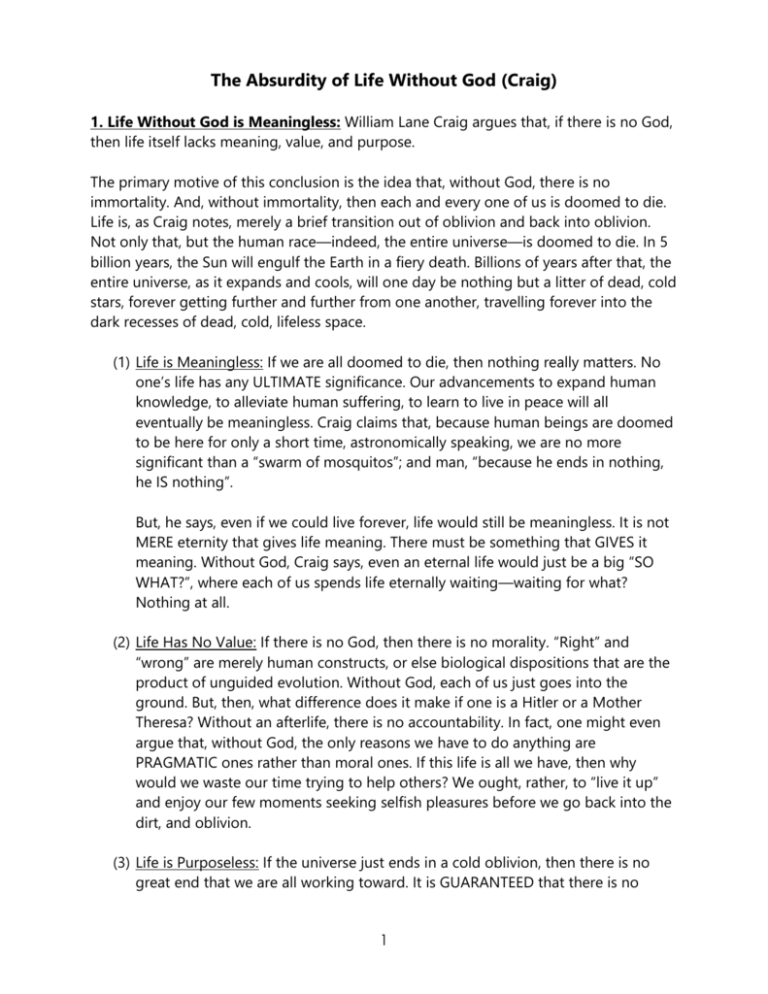
The Absurdity of Life Without God (Craig) 1. Life Without God is Meaningless: William Lane Craig argues that, if there is no God, then life itself lacks meaning, value, and purpose. The primary motive of this conclusion is the idea that, without God, there is no immortality. And, without immortality, then each and every one of us is doomed to die. Life is, as Craig notes, merely a brief transition out of oblivion and back into oblivion. Not only that, but the human race—indeed, the entire universe—is doomed to die. In 5 billion years, the Sun will engulf the Earth in a fiery death. Billions of years after that, the entire universe, as it expands and cools, will one day be nothing but a litter of dead, cold stars, forever getting further and further from one another, travelling forever into the dark recesses of dead, cold, lifeless space. (1) Life is Meaningless: If we are all doomed to die, then nothing really matters. No one’s life has any ULTIMATE significance. Our advancements to expand human knowledge, to alleviate human suffering, to learn to live in peace will all eventually be meaningless. Craig claims that, because human beings are doomed to be here for only a short time, astronomically speaking, we are no more significant than a “swarm of mosquitos”; and man, “because he ends in nothing, he IS nothing”. But, he says, even if we could live forever, life would still be meaningless. It is not MERE eternity that gives life meaning. There must be something that GIVES it meaning. Without God, Craig says, even an eternal life would just be a big “SO WHAT?”, where each of us spends life eternally waiting—waiting for what? Nothing at all. (2) Life Has No Value: If there is no God, then there is no morality. “Right” and “wrong” are merely human constructs, or else biological dispositions that are the product of unguided evolution. Without God, each of us just goes into the ground. But, then, what difference does it make if one is a Hitler or a Mother Theresa? Without an afterlife, there is no accountability. In fact, one might even argue that, without God, the only reasons we have to do anything are PRAGMATIC ones rather than moral ones. If this life is all we have, then why would we waste our time trying to help others? We ought, rather, to “live it up” and enjoy our few moments seeking selfish pleasures before we go back into the dirt, and oblivion. (3) Life is Purposeless: If the universe just ends in a cold oblivion, then there is no great end that we are all working toward. It is GUARANTEED that there is no 1 point in the future where “it all works out in the end”. Rather, if we could peer into the future, what we would see is a cold, dead, lifeless universe. But, then, there is no goal, no purpose to life. Any supposed “successes” that we achieve in our lives, or for mankind, are just fleeting, and doomed to be destroyed in the end. A universe governed by purposeless chance makes any momentary life within it also ungoverned and purposeless. Furthermore, even if we could somehow live forever, the fact would remain that our very existence is without purpose. Human beings would still just be an unintended accident of nature, a product of blind chance. As such, there could be no REASON why we’re here at all. So, even if we were immortal, life itself would still be without purpose if there is no God. Conclusion: When the movement toward atheism was born, about 100-150 years ago, a philosophy called “Existentialism” was born. You may have heard of the “existential crisis”. This is the crisis that comes with recognizing that there is no God. Simply put, if there is no God, then life is absolutely absurd. For, without God, it has no meaning, value, or purpose. 2. Embracing the Absurd: The greatest hope that the existentialists can give us—at least those who did not commit suicide or spend the rest of their lives as drug addicts after their realization—is this: Embrace the absurdity. Just admit that life is absurd and carry on. In the short while that we have, perhaps we can nevertheless find our OWN meaning, value, and purpose in life, and the world. (1) Finding Meaning: The existentialist might say that, even if there is no OBJECTIVE meaning to life, we can nevertheless place our OWN meaning on it. For instance, all the time, human beings might engage in menial tasks that are doomed to be destroyed eventually, and might say, “Sure, it’s not very meaningful I guess, but it’s meaningful TO ME.” And this sort of subjective meaning is enough. Reply: Craig accuses this way of thought of being an “exercise in self-delusion”. It is as if the speaker is just PRETENDING that there is objective meaning in the world, and carrying on as if this is true. SAYING that something has meaning to you doesn’t make it ACTUALLY have meaning (in the real, or objective sense). (2) Finding Value: The existentialist might say that, even if there is no OBJECTIVE right and wrong, we may still live according to certain “moral” norms. For, certainly we still FEEL as if certain actions are repugnant. Though sawing a child in half may not be wrong in some ULTIMATE sense, surely it still offends our senses, and so provides us with reasons to avoid, or even condemn such actions. 2 Reply: But, the fact remains that the suggestion here is merely that we live AS IF there is morality. Again, it is self-delusion. Strictly speaking, if there is no objective morality, one must admit that sawing a child in half is NOT wrong—but rather just “not fashionable” or “not admired” by most others. But, we could work to change that. We could work to change the views of society, and perhaps one day sawing children into pieces WOULD be fashionable. And, if there is no God, it would not be wrong—in fact, humanity would even deem it to be permissible in that case, since (in that future society) most people approved of it. But, that is absurd. As it turns out, most prominent atheists and existentialists have actually CONDEMNED terrible actions. They condemned the atrocities of World War II, and anti-Semitism, and social injustices, claiming that human beings were creatures of value, who deserved respect and fair treatment, not torture and suffering. But, on what grounds can they condemn such actions? Because they personally FEEL repulsed by them? Ultimately, if there is no objective morality, there are no grounds upon which to morally condemn the actions of others. (3) Finding Purpose: The atheist again might claim that we find our OWN purpose in life. While it is true that we weren’t “placed here” with a direction or purpose, with our short lives we find one that we like, and that BECOMES our purpose. While it may not be true in some OBJECTIVE sense that that just IS our purpose, we give life purpose and direction with our choices. Reply: Again, the atheist is suggestion that we “make up” our own purpose. But, something “made up” is imaginary. It is not real. Even the imagined “purpose” of evolution is not a real one. Sure, it SELECTS for organisms that are better at surviving and procreating, but survival of the human race is not our “purpose”. Evolution is purposeless, though we mistakenly tend to think of it, or the universe, as having a purpose for us nevertheless. The fact remains that, without God, anyone’s self-imagined “purpose” would be just as good as anyone else’s. Hitler’s self-created “purpose” was to purify the human race by killing everyone except the blonde, fair-skinned Arian race. A terrorist’s is to destroy those whom s/he disagrees with politically or religiously. But, then, without God, these people are just doing what the atheist thinks we should ALL be doing: Finding our own mission and pursuing it; and no one’s is better or worse than anyone else’s. 3 3. Conclusion: God and Meaning: Craig concludes that the atheist who claims that we CAN find value, meaning, and purpose is living a lie, a contradiction. He paints a picture of a two-story universe. In the lower tier, there is no God and all is meaningless. In the upper tier, there is a God, and life has meaning. What these atheists are suggesting is that we climb from the first story to the second and sort of “steal fire from the Gods”, claiming things for our own which we have absolutely no right to—indeed, which don’t even EXIST if there is no God. Such an exercise is the greatest kind of self-delusion that one can create. The atheist is left, then, with two options: (a) Admit the absurdity of life, and live the rest of it profoundly unhappy. (b) Deny the absurdity, claiming that there is meaning, value, and purpose in life even in the absence of God, finding happiness perhaps, but living the rest of life in a self-deluded, self-contradictory lie. On the other hand, theism offers a reconciliation of these two options. For, with theism, one can have both happiness AND consistency, or truth: (c) Believe in God, who gives meaning, value, and purpose to life, and live happily without living a lie, or a delusion. In a way, we might almost view Craig’s paper as an argument for God’s existence, based on our very strong intuition that life is not meaningless. Something like the following: 1. If God does not exist, then life is meaningless. 2. But, life IS NOT meaningless. 3. Therefore, God exists. 4 Embracing Absurdity (Nagel) 1. The Absurd: Thomas Nagel denies these accusations. He begins by noting 3 things: (1) It is often pointed out that, if life won’t matter in a million years, then it does not matter now. But, why would that be the case? Nagel suggests that, whether or not something matters in a million years depends on whether or not it mattered, period. (2) Reference to our minute-ness is often made in order to show that life is meaningless. For instance, we are just specks of dust in a vast universe, or that our time here is but a tiny blip in the staggering history of the universe. But, why should size have anything to do with the question of whether or not life has meaning? Surely, life would not become MORE meaningful if we were larger, compared to the universe, or lived longer, compared to its timespan? (3) It is often mentioned that, since the END will be nothing, then everything done before then is meaningless. As Nagel puts it, life is portrayed as “an elaborate journey leading nowhere”. But, why should the fact that something comes to an end render it meaningless? Surely, it does not make sense to say that, because there will someday be no human beings to appreciate art, that there is no reason to create art NOW; or that, because there will someday be no humans to experience pain, that there is no reason to take an aspirin or prevent a child from putting their hand on a hot stove NOW. The motive for this third complaint seems to be that everything needs to be justified by something OUTSIDE itself. But, then, even if there WERE something outside of mankind to justify mankind’s actions, or purpose, then THAT thing would need something further still to justify IT, and so on, ad infinitum. The Nature of Absurdity: Absurdity is defined as follows: Absurdity: When there is a tension between aspiration, belief, or intention, and reality. 5 We typically use the word to mean something like “obviously false” or “irrational”, but the sort of absurdity that Craig accuses the atheist of living is more of a conflict between the way one lives one’s life (as if there is meaning, value, and purpose) and reality. Nagel says the conflict has to do with the SERIOUSNESS with which we take life. We act AS IF life has some ultimate, objective seriousness about it, though it does not. We see this because we are, among the animals, uniquely able to step back and view our own lives from a detached, 3rd person perspective; and from there, it often seems as if all of our life-long struggles and daily pursuits are ARBITRARY. Yet, we continue to plod along living life 24 hours a day anyway—and that is the absurdity. We often believe we can avoid the conclusion of the arbitrariness of our own personal decisions if we attach ourselves to something bigger, something greater. So, people might devote their lives to a team, a family, a society, or a religion. But, Nagel points out, this only removes the question one level: For, attaching ourselves to something bigger does not make life any less arbitrary unless that something bigger is ITSELF not arbitrary. Imagine that we discovered that planet Earth was actually a giant factory farm used to feed aliens human flesh. THAT would be something bigger that would make our lives meaningful TO THEM (the aliens), but it would still not answer the question of whether or not life was meaningful TO US. So, even if there IS something bigger than us, which has a purpose for us (whether God, or country, or aliens), that does not confer meaning FOR US; rather, whatever meaning our lives had would only be THEIR meaning or purpose for us. To be meaningful FOR US, we would still have to PERSONALLY identify with those goals, or purposes for us. In short, what really matters is what purpose WE have for ourselves. External World Skepticism: Nagel likens our predicament to that of skepticism in general. We live out every day as if we are sure that there is a world around us, though we cannot ever know with certainty that we are not dreaming. Thus, even taking your senses at face value is ABSURD in some sense—for there is a tension between what we claim to know, and what we can really know. Nevertheless, we DO have reasons to act in certain ways. Even if I am dreaming, I can be pretty sure that, in the dream, if I put my hand on a hot stove, it will nevertheless HURT. If this is a dream, then dream-pain is still PAINFUL! But, that is all that the atheist can do as well, with respect to meaning and purpose. Even though we have no basis upon which to judge the meaningfulness of our lives in some 6 ultimate or objective sense, we still have REASONS to act in certain ways. We have present reasons, here and now, to go on living our lives. Nagel presents three options: (a) Accept that life is absurd, and live one’s life tragically, in despair. (b) Accept that life is absurd, and live one’s life as a hero, “shaking one’s fist at the universe” which never hears our pleas, and living on IN SPITE of meaninglessness. (c) Embrace absurdity, living a life of meaning, value, and purpose, despite the fact that when we view ourselves from a bird’s-eye perspective, it all appears arbitrary and absurd to us. Nagel sees no point in responding to absurdity with despair or anger, but with resignation. After all, we do not respond to the possibility that we might be dreaming with despair or anger, but rather simply continue to plod along nevertheless. That is, Nagel says, what makes us human beings. 2. A Note On Objective Value: Craig’s main point seems to be that life without some external being to GIVE it meaning, therefore has no meaning. Of mankind: “Because he ends in nothing, he IS nothing.” But, is this inference correct? Aren’t there ANY reasons to do things NOW even if the future of mankind is extinction, and the future of each person is death? Is, for instance, sawing a child in half no more than merely a separation of atoms? Many atheists have taken a cue from the ethical view called utilitarianism, and have claimed that, with or without God, there is objective value in the world. 1) Intrinsic goods: These are things that are desirable for their own sake. They are, as J.S. Mill stated, “desirable as ends.” They are good, in and of themselves. 2) Instrumental goods: These are things that are called “good”, but only insofar as they make it easier for us to obtain intrinsic goods. They are desirable only because they are a means to some further good end. They are not desirable for their own sake. For example, money is only “instrumentally good.” It is only good because it is a means to obtaining other good stuff. Money is not desirable for it’s own sake. Are there any intrinsic goods? Utilitarians argue that HAPPINESS is intrinsically good. It is desirable for its own sake. If we just had some happiness, we would value it, even if it did not lead to anything else. But, this fact seems true, whether or not there is a God. Furthermore, we 7 can extrapolate, since OUR happiness has value, then so do OTHER people’s happiness. This might even give rise to a normative theory (about what we SHOULD do), since it seems like we SHOULD do whatever we have the most REASONS to do—and what better reasons to do anything than to seek what is GOOD? In short, perhaps ending a child’s suffering is not meaningless because pain is bad, and we have the ability to end something that is BAD RIGHT NOW. Perhaps creating beauty is not meaningless because appreciation of beauty is a pleasure, and we have the ability to inspire this (intrinsically good) experience HERE AND NOW. We might, contrary to Craig, think that one who concludes that life is meaningless without God, or that no action has any good reasons behind it—THAT is absurd (see the film, Adaptation). 8
